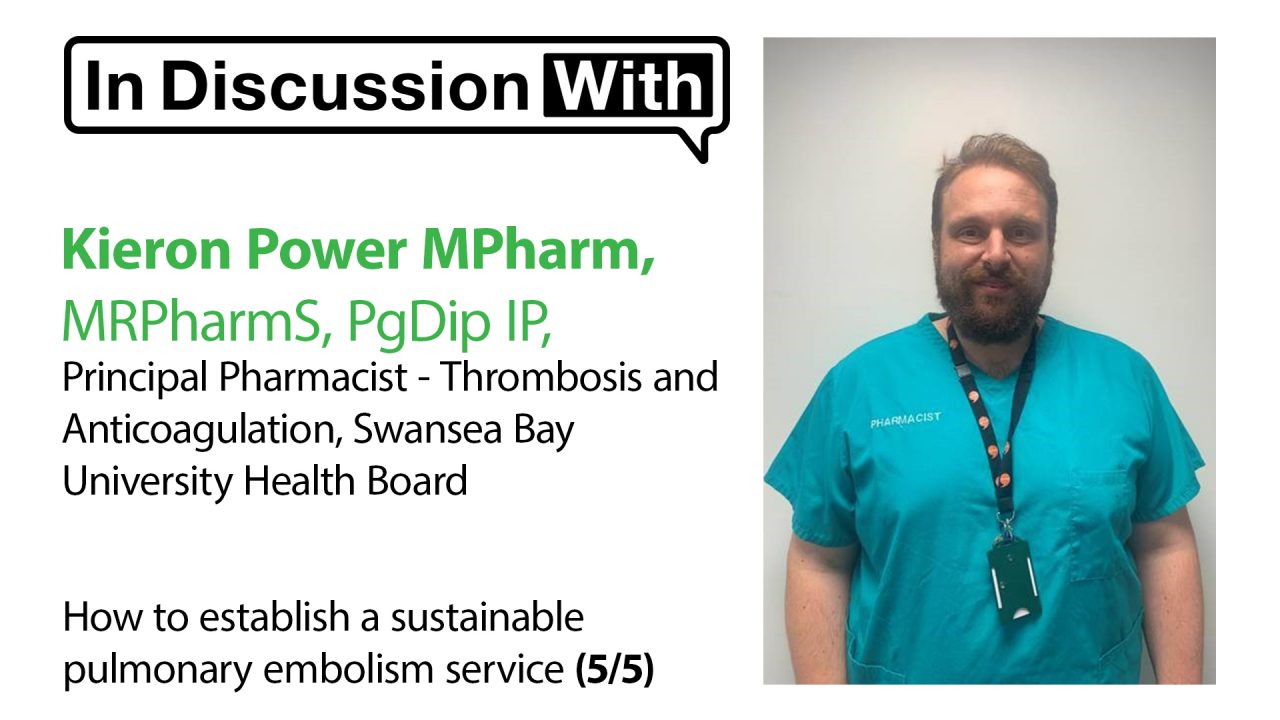Advertisment
How to establish a sustainable pulmonary embolism service

A number of features have contributed to the success of the pharmacy-led outpatient PE pathway including a close working relationship with the doctors, the systematic delivery of seven-day follow-up and pharmacists’ acquisition of advanced practice skills, says Kieron Power, Principal Pharmacist for Thrombosis and Anticoagulation in Swansea Bay University Health Board.
One concern that is often voiced is the issue of whether junior doctors become de-skilled at some aspects of patient care because clinical pharmacists have taken them over. Mr Power acknowledges that junior doctors now make decisions about duration of anticoagulation less frequently than in the past, “because when we see patients to that three-month point, one of the key things that we do is decide, ‘how long are we going to anticoagulate this patient for?’ – and actually we are doing that almost exclusively within the Health Board”. As a result, some registrars and other junior doctors have sat in on pharmacists’ clinics – an experience that Mr Power says has been mutually beneficial. “I’ve been very keen to learn from them in terms of their skill set, in terms of how they would approach certain aspects and they’ve been very keen to learn from me. Again, I think that’s been a really positive experience, especially because we’re working at this advanced practice level, that we’re able to have a little bit of an idea sharing as well so that we’re continuously improving what we’re delivering to our patients”, he says.
Patients who have experienced a pulmonary embolism (PE) are very anxious. Anecdotal feedback from patients suggests that those who have gone through the ambulatory pathway tend to be less anxious. This may be because “they don’t really associate themselves as having an acute serious condition until they’re told following the CTPA (computed tomography pulmonary angiogram). The patients who have far more traumatic events and are hospitalised have far greater levels of anxiety”, explains Mr Power. Prompt follow-up appears to a major factor contributing to patient satisfaction. “We offer a dedicated clinic for VTE (venous thromboembolism), we have the knowledge of the condition, we’re able to sit down with the patient and have a discussion around the diagnosis to help them to understand how the recovery process works”, he says. “Patients really do seem to respond really well to the service and are very appreciative of having that prompt follow-up”, he adds.
Comprehensive VTE management
The outpatient PE pathway adds an extra dimension to the existing VTE service. Initially the service was primarily focused on the management of deep vein thromboses (DVTs) and cancer-associated thromboses. The PE pathway “was the natural next step to ensure that we have a fully comprehensive VTE service which is addressing all of the most common presentations of VTE and offering a high-quality service …. that’s delivering good patient outcomes and is sustainable”, he says.
The current arrangement is funded to provide 37.5 hours per week of VTE service. The team is able to handle both new and follow-up patients and it receives referrals from the SDEC (Same-Day Emergency Care) unit where it is based and other Health Boards.
The main priority for the immediate future is the working framework and training process. An 18-month competency-based training programme that includes much supervised and semi-supervised practice has been developed. Mr Power hopes that in future this might form the basis of a national training framework for pharmacists and other health care professionals who wish to work in this area.
About Kieron Power
Kieron Power is Principal Pharmacist for Thrombosis and Anticoagulation in Swansea Bay University Health Board in South Wales. His role comprises three elements:
- Thrombosis and Anticoagulation Lead for the health board – a governance role that involves leading on policy and guidance within the Health Board and performance monitoring for hospital-acquired thrombosis rates, venous thromboembolism risk assessments and general anticoagulation prescribing factors.
- Running a weekly thrombosis and anticoagulation specialist clinic on behalf of the consultant haematologists.
- Leading and running the pharmacist-led acute VTE service and follow-up service that operate within the health board
Read and watch the full series on our website or on YouTube.








